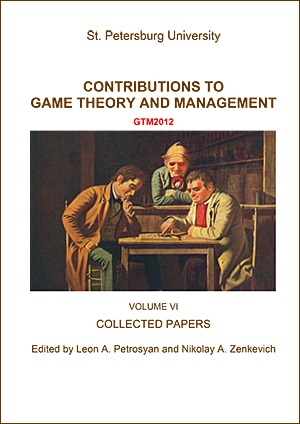Network Game of Pollution Cost Reduction
Abstract
In this paper a n-person network game theoretical model of emission
reduction is considered. Each player has its own evolution of the stock of
accumulated pollution. Dynamics of player i, i = 1, ..., n depends on emissions
of players k ∈ Ki, where Ki is the set of players which are connected by
arcs with player i. Nash Equilibrium is constructed. The cooperative game is
considered. As optimal imputation the ES-value is supposed. The restriction
on network structure to realization the irrational behavior proof condition
is deduced.
Keywords:
network game, Nash equilibrium, ES-value, imputation destribution procedure, irrational behavior proof
Downloads
References
Driessen, T. S. H. and Y. Funaki (1991). Coincidence of and collinearity between game theoretic solutions. OR Spektrum, 13, 15–30.
Dockner, E. J., S. Jorgensen, N. van Long and G. Sorger (2000). Differential Games in Economics and Management Science. Cambridge University Press, 41–85.
Haurie, A. and G. Zaccour (1995). Differential game models of global environment management // Annals of the International Society of Dynamic Games, 2, 3–24.
Iljina, A., Kozlovskaya, N. (2010). D. W. K. Yeung's Condition for the coalitional solution of the game of pollution cost reduction. // Graduate School of Management, Contributions to game theory and management, 3, 171–181.
Kaitala, V. and M. Pohjola (1995). Sustainable international agreements on green house warming: a game theory study // Annals of the International Society of Dynamic Games, 2, 67–88.
Owen, G. (1997). Values of games with a priory unions. In: R. Henn and O. Moeschlin (eds.). Mathematical Economy and Game Theory (Berlin), 78–88.
Petrosjan, L. (1993). Differential Games of Pursuit. World Sci. Pbl., 320.
Petrosjan, L. A. (2010). Cooperative differential games on networks. Trudy Inst. Mat. i Mekh. UrO RAN, 16(5), 143–150.
Petrosjan, L. and G. Zaccour (2003). Time-consistent Shapley value allocation of pollution cost reduction // Journal of Economic Dynamics and Control, 27, 381–398.
Yeung, D. W. K. (2006). An irrational - behavior - proofness condition in cooperative differential games // Intern. J. of Game Theory Rew., 8, 739–744.
Yeung, D. W. K., L. A. Petrosjan (2006). Cooperative Stochastic Differential Games, Springer Science+Business Media. Springer Science+Business Media.
Downloads
Published
How to Cite
Issue
Section
License
Articles of "Contributions to Game Theory and Management" are open access distributed under the terms of the License Agreement with Saint Petersburg State University, which permits to the authors unrestricted distribution and self-archiving free of charge.




